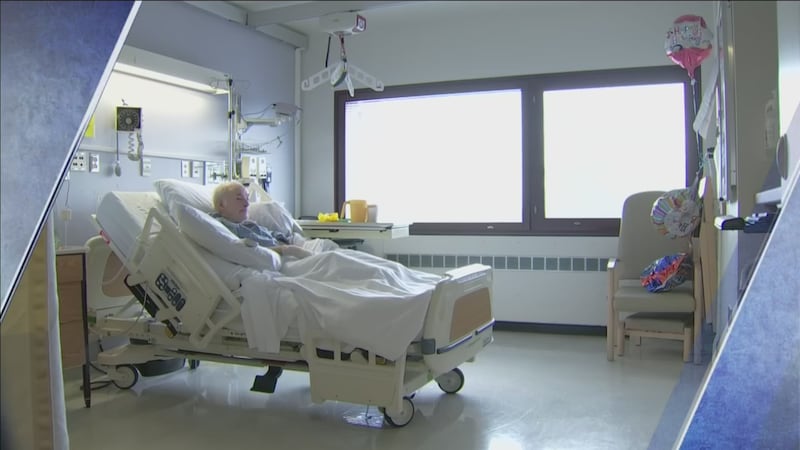A mystery patient at the University of Washington Medical Center has been identified.
KIRO 7 is not revealing his full name because of privacy issues. For six months, the man who called himself "Kenny Kenny" was confined to a bed while authorities searched for his real identity.
Kenny has dementia and is believed to have been homeless for at least three decades.
His legs and fingertips were amputated because of severe frostbite and that made it impossible to identify him through fingerprints.
Channa Copeland is Kenny’s legal guardian and was on a mission to find his real identity.
"He could be anybody's grandpa," Copeland said of Kenny. "He could be anybody's father. He has this kind, gentle face."
Kenny was found in December inside trash bags on the stoop of University Christian Church.
“This is the first one I've had that there's no identity to be had at all. Usually fingerprinting can get us something and with Kenny there was no way to fingerprint," Copeland said.
Copeland runs a nonprofit called "NorthStar Connections" and focuses on the most challenging cases of guardianship.
Copeland also discovered the true identity of a different man who lived on Seattle streets and sold Real Change newspapers. The man was calling himself Jonas Stone.
Copeland was able to figure out Stone's legal name, which led her to his children.
She tracked down his daughters, who hadn't seen their father in decades.
Andrea Slade, one of Stone's daughters, rushed to her father's bedside at Harborview.
The last time she had seen him, she was 3 years old.
"It was heartbreaking," Slade said. "I was mad. I was sad."
Stone died on his birthday at 60 years old.
“I’m honored that I got to share that with my father, even if I didn’t get to see him for two decades. At least I got to be there in the end for him and that he wasn’t alone,” Slade said.
The photos embedded below of Jonas Stone are courtesy of Jim McKeever.
"I call it 'The Channa Factor,'” said attorney Linda Burbank, who specializes in guardianship cases and marvels at the work of Copeland.
“I've been a registered nurse for 18 years, an attorney for 11 years, and work in an acute care hospital setting and the work that she does is unique. There's not anyone out there doing it the way that she's doing it," Burbank said.
Kenny’s case underscores a growing problem in Seattle.
With the homeless crisis comes a growing challenge of identifying people who do not know their names.
“In a moment of crisis, you can't get their Social Security benefits turned on. You can't get their Medicaid turned on. You can't do any of that stuff without that," said Copeland.
Identifying the “unknowns” is a priority at the King County Medical Examiner’s office.
"The unidentified situation in this country is often referred to as our ‘silent mass disaster’ because we have so many unidentifieds. At any given time, the number's usually quoted around 40,000 in this country," said King County forensic anthropologist Dr. Kathy Taylor.
Taylor has released five sketches of people whose remains are unidentified. See the sketches at the bottom of this article in a GIF or in this photo gallery.
Taylor also wants to exhume the unidentified bodies of 10 people who were buried before the advent of DNA testing. "I would love at some point to get some of those individuals out of the ground,” said Taylor.
Last week, through DNA testing, Copeland was able to track down the identity of “Kenny Kenny.”
Copeland said, “We figured it out. He’s not Kenny, nothing near Kenny. Nope, there’s no Kenny at all in his name.”
Standing beside his hospital bed, Copeland spoke to “Kenny” about his family.
"I found your sister. Do you know who your sister is? Do you remember her name? Any idea?” said Copeland. Kenny was told that he lived in Renton, Bainbridge Island and Winslow, but told Copeland he did not remember.
Copeland also discovered that “Kenny” served in the Air Force and was honorably discharged. He has not cashed his veteran pension checks from the 1980s. “You don't remember ever going into the Air Force?” said Copeland. “No,” responded Kenny.
Listen to Copeland tell "Kenny" about himself here.
Kenny will likely be taken to a Veteran’s Administration hospital and fitted with prosthetics or a wheelchair. Copeland said she will visit him once or twice a month.
“He will have all of his needs met. Either that or he will go to an adult family home. But he will never, ever be homeless again. You will never see Kenny on the streets of Seattle again."
How you can help: Channa Copeland's nonprofit, NorthStar Connections, is looking for volunteers, donations and board members to continue the mission of providing guardianship for the most vulnerable residents of our area.
See sketches created from unidentified remains in King County embedded below or at this link.
If you have information about any of the sketches, call the King County Medical Examiner’s Office at 206-731-3232.
A Department of Justice website helps families track missing and unidentified persons throughout the United States. Visit that link here.
More news from KIRO 7
- Woman says her Amazon device recorded private conversation, sent it out to random contact
- Identity of mystery man 'Kenny' revealed
- Scientists discover opioids in some Puget Sound mussels
- South Sound 5th-grader takes his own life, parents urged to talk to their kids about suicide
- "Tone Deaf" - Seahawks' Doug Baldwin rips new NFL anthem policy
Cox Media Group








